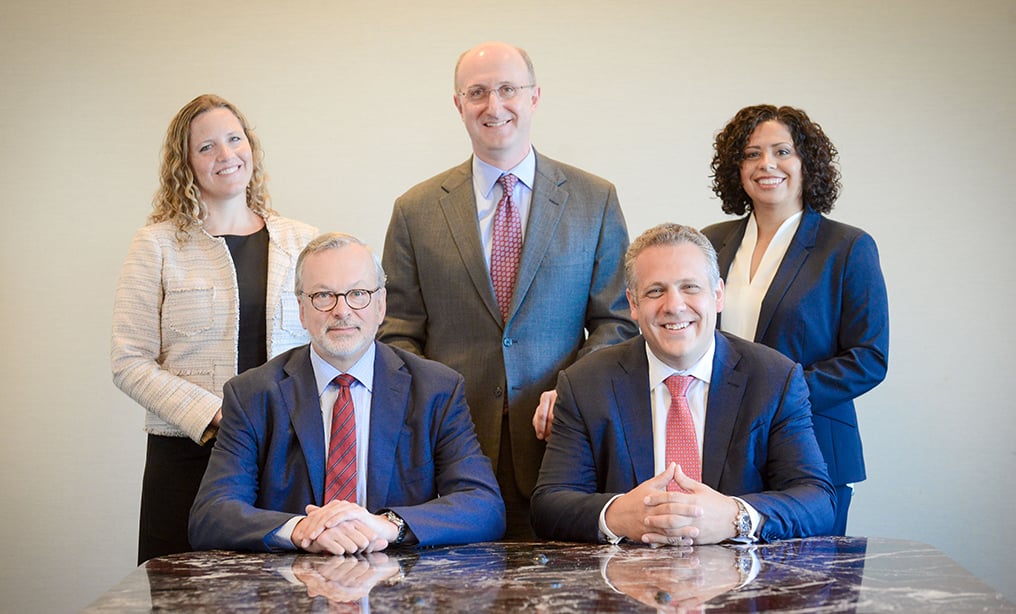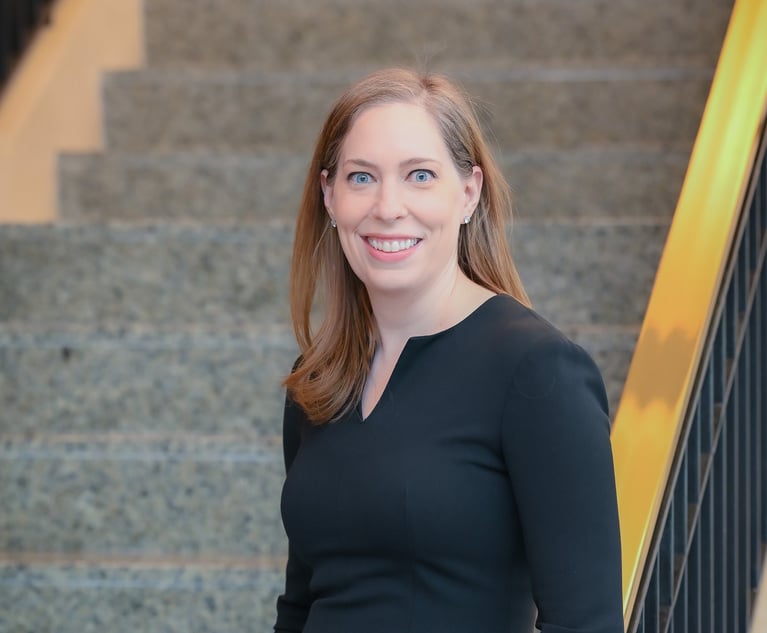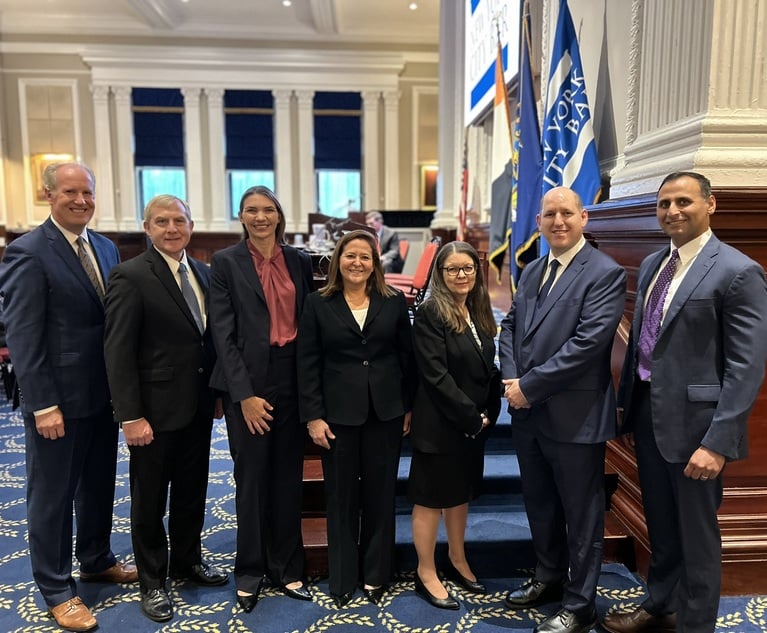Litigation Department of the Year Winner: Cravath, Swaine & Moore
In the same month last year we saw two major wins that exemplify the high-stakes litigation and exceptional client relationships Cravath is known for.
October 16, 2019 at 11:12 AM
4 minute read
 Seated, from left, litigation partners Peter Barbur and Kevin Orsini; standing, from left, litigation partners Rory Leraris, Daniel Slifkin, head of litigation, and Damaris Hernández (Photo by David Handschuh/NYLJ)
Seated, from left, litigation partners Peter Barbur and Kevin Orsini; standing, from left, litigation partners Rory Leraris, Daniel Slifkin, head of litigation, and Damaris Hernández (Photo by David Handschuh/NYLJ)
What are some of the department's most satisfying successes of the past year and why? In the same month last year we saw two major wins that exemplify the high-stakes litigation and exceptional client relationships Cravath is known for. For American Express, we won a Supreme Court victory that vindicated the company's business model and defines how antitrust law will be applied to two-sided markets. We led AmEx through a decade of investigation, trial and appeals, and the company trusted the firm and our strategy each step of the way. For Time Warner we defeated at trial a suit by the DOJ seeking to block the company's $109 billion merger with AT&T—the government's first challenge to a vertical merger in decades. Time has been a client for nearly a century and it was incredibly gratifying to usher the company through its latest transformation.
A prospective client in crisis calls and asks why your team should be retained. What is your answer? Dealing with crises is what Cravath does best. As a generalist firm, our attorneys have the breadth and depth of experience to handle clients' most important matters, no matter the practice area, tribunal or party role. We thrive when tackling the most complex and consequential matters, digging in from day one to develop the approach that will yield the best legal and business result. AmEx and Time Warner are great examples of this, but so is our recent work for Qualcomm in its massive legal battle against Apple, which included coordinating matters across three continents, trying two cases before the U.S. ITC, and securing a global settlement between the companies after opening arguments in a third trial in California.
What traits do you respect most in opposing firms and lawyers? Honesty and professionalism are important qualities for all attorneys and we appreciate opposing counsel who approach litigation not as a schoolyard fight, but as a way to resolve disputes professionally and civilly. We also have a great deal of respect for opposing lawyers with strong trial skills.
What sorts of trends are you seeing in litigation, and what do you think will be the most important development in the law/legal business that will impact your field in the next 10 years? The legal industry is constantly evolving and, as a 200-year-old firm, we've seen a lot of changes. We expect AI will deliver enormous benefits in the coming decade, including saving clients money and streamlining attorney training. We have expanded our use of AI at Cravath to enable our attorneys to focus more on the high-level work where they add the most value. We're also seeing greater segmentation in the legal profession as litigation has become increasingly commoditized. As a result, the top tier where the most important legal work is done—and where Cravath focuses—is becoming more competitive and firms will need to further distinguish themselves to remain in this space.
What is the firm doing to ensure that future generations of litigators are ready to take the helm? Associate training has been a hallmark of the firm for more than century. It is of paramount importance to us because we promote almost exclusively from within. We carefully select the most promising young attorneys straight from law school and train them in the Cravath style. For litigators, this means gaining broad experience by rotating through all practice areas and preparing for every matter as if it is going to trial. We also staff matters leanly, which gives our associates early opportunities for growth and leadership. Our partners went through the same rigorous training as associates and trust that the system prepares their associate teams to handle significant responsibilities at every stage.
This content has been archived. It is available through our partners, LexisNexis® and Bloomberg Law.
To view this content, please continue to their sites.
Not a Lexis Subscriber?
Subscribe Now
Not a Bloomberg Law Subscriber?
Subscribe Now
NOT FOR REPRINT
© 2025 ALM Global, LLC, All Rights Reserved. Request academic re-use from www.copyright.com. All other uses, submit a request to [email protected]. For more information visit Asset & Logo Licensing.
You Might Like
View All
Elizabeth Cooper of Simpson Thacher on Building Teams in a 'Relationship Business'
4 minute read
For Paul Weiss, Progress Means 'Embracing the Uncomfortable Reality'
5 minute read
Kenneth Feinberg Had Dreams of Being on the Big Screen. His 9/11 Victims Fund Gave Him an Unexpected Star Turn

City Bar Holds 32nd Annual Henry L. Stimson Medal Presentation
Trending Stories
- 1Decision of the Day: Court Holds Accident with Post Driver Was 'Bizarre Occurrence,' Dismisses Action Brought Under Labor Law §240
- 2Judge Recommends Disbarment for Attorney Who Plotted to Hack Judge's Email, Phone
- 3Two Wilkinson Stekloff Associates Among Victims of DC Plane Crash
- 4Two More Victims Alleged in New Sean Combs Sex Trafficking Indictment
- 5Jackson Lewis Leaders Discuss Firm's Innovation Efforts, From Prompt-a-Thons to Gen AI Pilots
Who Got The Work
J. Brugh Lower of Gibbons has entered an appearance for industrial equipment supplier Devco Corporation in a pending trademark infringement lawsuit. The suit, accusing the defendant of selling knock-off Graco products, was filed Dec. 18 in New Jersey District Court by Rivkin Radler on behalf of Graco Inc. and Graco Minnesota. The case, assigned to U.S. District Judge Zahid N. Quraishi, is 3:24-cv-11294, Graco Inc. et al v. Devco Corporation.
Who Got The Work
Rebecca Maller-Stein and Kent A. Yalowitz of Arnold & Porter Kaye Scholer have entered their appearances for Hanaco Venture Capital and its executives, Lior Prosor and David Frankel, in a pending securities lawsuit. The action, filed on Dec. 24 in New York Southern District Court by Zell, Aron & Co. on behalf of Goldeneye Advisors, accuses the defendants of negligently and fraudulently managing the plaintiff's $1 million investment. The case, assigned to U.S. District Judge Vernon S. Broderick, is 1:24-cv-09918, Goldeneye Advisors, LLC v. Hanaco Venture Capital, Ltd. et al.
Who Got The Work
Attorneys from A&O Shearman has stepped in as defense counsel for Toronto-Dominion Bank and other defendants in a pending securities class action. The suit, filed Dec. 11 in New York Southern District Court by Bleichmar Fonti & Auld, accuses the defendants of concealing the bank's 'pervasive' deficiencies in regards to its compliance with the Bank Secrecy Act and the quality of its anti-money laundering controls. The case, assigned to U.S. District Judge Arun Subramanian, is 1:24-cv-09445, Gonzalez v. The Toronto-Dominion Bank et al.
Who Got The Work
Crown Castle International, a Pennsylvania company providing shared communications infrastructure, has turned to Luke D. Wolf of Gordon Rees Scully Mansukhani to fend off a pending breach-of-contract lawsuit. The court action, filed Nov. 25 in Michigan Eastern District Court by Hooper Hathaway PC on behalf of The Town Residences LLC, accuses Crown Castle of failing to transfer approximately $30,000 in utility payments from T-Mobile in breach of a roof-top lease and assignment agreement. The case, assigned to U.S. District Judge Susan K. Declercq, is 2:24-cv-13131, The Town Residences LLC v. T-Mobile US, Inc. et al.
Who Got The Work
Wilfred P. Coronato and Daniel M. Schwartz of McCarter & English have stepped in as defense counsel to Electrolux Home Products Inc. in a pending product liability lawsuit. The court action, filed Nov. 26 in New York Eastern District Court by Poulos Lopiccolo PC and Nagel Rice LLP on behalf of David Stern, alleges that the defendant's refrigerators’ drawers and shelving repeatedly break and fall apart within months after purchase. The case, assigned to U.S. District Judge Joan M. Azrack, is 2:24-cv-08204, Stern v. Electrolux Home Products, Inc.
Featured Firms
Law Offices of Gary Martin Hays & Associates, P.C.
(470) 294-1674
Law Offices of Mark E. Salomone
(857) 444-6468
Smith & Hassler
(713) 739-1250






